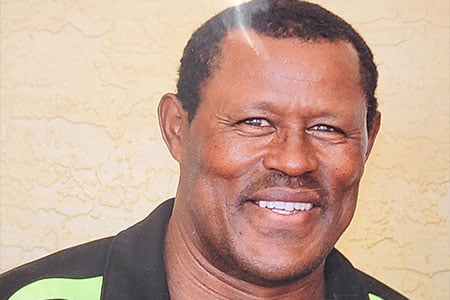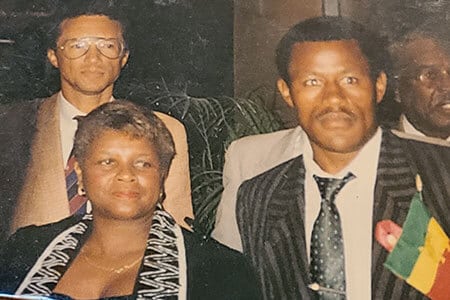USTA Florida is celebrating Black History Month this February by shining the spotlight on members of the vast Florida tennis community. Having won the Professional Tennis Registry (PTR) 2018 Humanitarian award due to his work in giving back to players who are marginalized, is Habtu Afework Belayneh, the Director of Tennis at Tivoli Lakes community in Boynton Beach, Florida.
“Not every humanitarian can create a foundation or has one that supports their good work,” said PTR Director of Communications Peggy Edwards. “Not every humanitarian is visible during a disaster, like J.J. Watt. Some live their lives every day as quiet humanitarians. They do their good work without expectations for praise or awards. Arthur Ashe said, ‘Start where you are. Use what you have. Do what you can.’ Afework does just that.”
“As the national team coach and technical head coach for the Ethiopian Tennis Federation in 1984-93, Afework was able to start the summer camp for underprivileged children and year-round junior development programs,” Edwards said. “Dozens of kids were introduced to tennis through these programs, but Afework wanted them to have more. He began looking for broader opportunities.”
Six to 12 of his players received scholarships at the Van der Meer Tennis Academy each year, and he has helped players receive college scholarships. His former students are now lawyers, bank vice presidents, and another owns a 16-court tennis facility.

What is your name? Habtu A. Belayneh
Birthplace? Addis Ababa, Ethiopia
Current city? Boynton Beach, Florida
What your current role (job), what you do, and how it is related to tennis? Working as Director of Tennis at Tivoli Lakes community. I am responsible for developing and promoting the tennis program for all age groups throughout the community.
How did you get involved in tennis? My tennis journey started as a ball-boy. I began to practice my tennis game after school and on weekends. My tennis skills improved over a short period of time and I began to play in junior tournaments.
What would you say is your greatest contribution to the sport? The greatest contribution to the sport of tennis is giving back to the sport that has given me so much. One of my main efforts is to give back to players who are in the marginalized community. My efforts to make a difference were noticed and I was nominated for The Professional Tennis Registry (PTR) 2018 Humanitarian award and received the honor. Similarly, the largest Men’s Tennis League here in Palm Beach County also awarded me a Humanitarian award and Pro of the Year Award for my long years of tennis service and dedication.
Does your family play tennis? Yes indeed, all my family members are tennis players except my mom. I’m introduced to the game with my immediate and I passed to my two youngest brothers. My wife, our son and daughter also tennis players, which has become tennis is our main family sport.
Why is it important to celebrate Black History Month in general, as well as in tennis? The main reason why we should all celebrate Black history month is to recognize, understand, and continue to advocate for equity in every arena of our lives. Moreover, celebrating Black History Month will give us the opportunity to celebrate icons such as the great Arthur Ashe. I love, respect and admire the late Arthur Ashe; it was a great honor to have met him in person and attend his presentation on tennis development, coaching skills and knowledge at the PTR annual International Symposium.
Why is celebrating Black history important to you? To honor the people who made a difference and commemorate their successful achievements. I’m delighted to continue the tradition by giving back to the community and those who need help and assistance.
How has Black history inspired you in tennis, or, your life in general? As Arthur said, “Start with Where You Are, Use What You Have and Do What You Can!” This quote has been my life principle and inspiration that propels me to continue to help the underserved and marginalized achieve their goals and help their dreams become reality. Most importantly, I try to be a role model for my mentees to become caring citizens.
Recently the conversation within many industries has been about racial equality, inclusion, and what’s being done to encourage it. How would you like to see these conversations impact the tennis industry? The tennis industry has a responsibility to promote, advocate, and educate racial equality. The industry must make a concentrated effort to stand against racism, anti-Semitism, and discrimination on the basis of sex in the workplace. Beyond promoting and advocating equity, it is vital to put action behind words and be involved by sponsoring social, cultural, and sport events in the community. Lastly, I hope that these conversations will create and give equal opportunity to minorities and provide tools that will enhance their success in their work environment.
Why is it important to not only support and celebrate other cultures, but be inclusive to all? The great Maya Angelou once said, “in diversity there is beauty and there is strength”. Celebrating and including all brings strength to all. Fundamentally, at the heart of inclusiveness is the inalienable right of a person to pursue their hopes and dreams in a society without systemic discriminations. In the end, I believe that we are all created equal and as such should receive equal opportunity. If we look back at history, there are moments that showed us the power of inclusiveness in sport.
If you’re interested in sharing your own story, experience or suggestions with us, please visit www.USTAFlorida.com/Amplify. To learn more about USTA Florida’s Amplify Project: the long-term initiative to engage and amplify Black voices throughout the Florida tennis community, click here.



